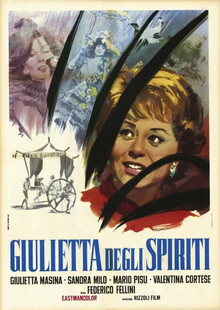Federico Fellini is of course one of the grandmasters of cinema and we’ve pretty much watched all of his greatest films already. This was one of the holdouts, being quite famous yet is not as highly regarded. It was his film feature film shot in color and the director sure went all out with it. There’s very little plot in it and almost every frame is a dream vision of surreal images, eccentric characters and fantastical sets. It’s exactly like an animated film except that it’s all real life. At first, I didn’t care for how random and spurious everything in it is, but the film grew on me when I realized how much thought and care went into every aspect of the production. In the end, I loved it and I applaud its theme of a not very attractive middle-aged woman seeking to liberate herself.
Giulietta Boldrini is a middle-age housewife who enjoys life in her large house while being served by dutiful maids and other servants. Her husband Giorgio seems to work in media relations and is often absent. Nonetheless she amuses herself with frequent house parties with guests that include her mother, her sisters and friends. During one such party, they attempt to contact spirits and Giuliette appears to connect to a spirit named Iris whose voice continues to speak to her throughout the film. As Giorgio grows ever more distant and one night cries out the name of another woman in his dreams, she is no longer able to deny the evidence that he is cheating on her. She seeks advice and reassurance from many different parties, mystics, a psychologist, and hires a private investigator to confirm her fears. She also gets to know her neighbor, Suzy, who openly leads a promiscuous and sexually liberated lifestyle in a house that resembles a fantastical brothel. Meanwhile, she continues to hear the voice of Iris whispering to her, recalls memories of her father who once flew again in a makeshift airplane and later experiences visions of things that aren’t real as her mental state deteriorates.
This film starts out rather innocuously with Giulietta being a not very attractive nor interesting woman in a fancy house. It ramps up after that however beginning with the dinner party guests attempting a seance session and the next day visiting the beach to see her neighbor bringing a veritable procession there as well. The colors, costumes, sets are just out of this world and become only become increasingly unhinged. It feels like once given access to color, Fellini went all out with it in an explosion of pure, unbridled imagination. It can feel overwhelming and even haphazard, but everything does make sense in context. Flashbacks of Giulietta’s childhood suggest an attachment to a strong father figure. Her involvement in a school play about the early Christians being put to death by the Romans recalls Christian guilt over sex. Her adventures with Suzy are all about giving in to decadence and debauchery and forgiving herself. Even if the story itself is straightforward, there’s so much to unpack in its themes and imagery.
Female sexual liberation was in vogue in the 1960s but I think it’s still quite bold of Fellini to make a middle-aged housewife his protagonist. He must have made a deliberate choice to downplay her physical attractiveness as Giulietta’s sisters, maids and even her mother are shown as being more conventionally beautiful and glamorous than her. Her neighbor Suzy represents the extreme end of the transformation away from being a dumpy housewife, free to prance around half-naked and unashamed. The question then is why end the film so ambiguously. I interpret the visions she experiences as backlash from a Judeo-Christian morality perspective which is alright by as something she needs to struggle against. Yet Fellini shies away from granting Giulietta a complete liberation. Arguably the ending could just as well mean that her mental state has completely broken down and she has become insane. Frankly that’s an unsatisfying conclusion that feels like chickening out to me.
Despite how it ends, I still loved it as an outrageously unhinged visual feast. I usually don’t like dream sequences because they feel so inconsequential. This one is pretty much nothing but an extended delirium, yet it’s so well made, so full of surprises and so wonderfully imaginative that I’m forced to admit that it really is that good. I’d bet it must have inspired many, many animators over the years as so many of its shots and visual devices are recognizable from animated films.
